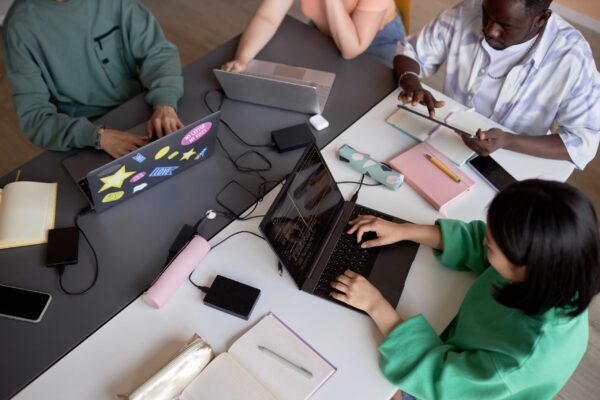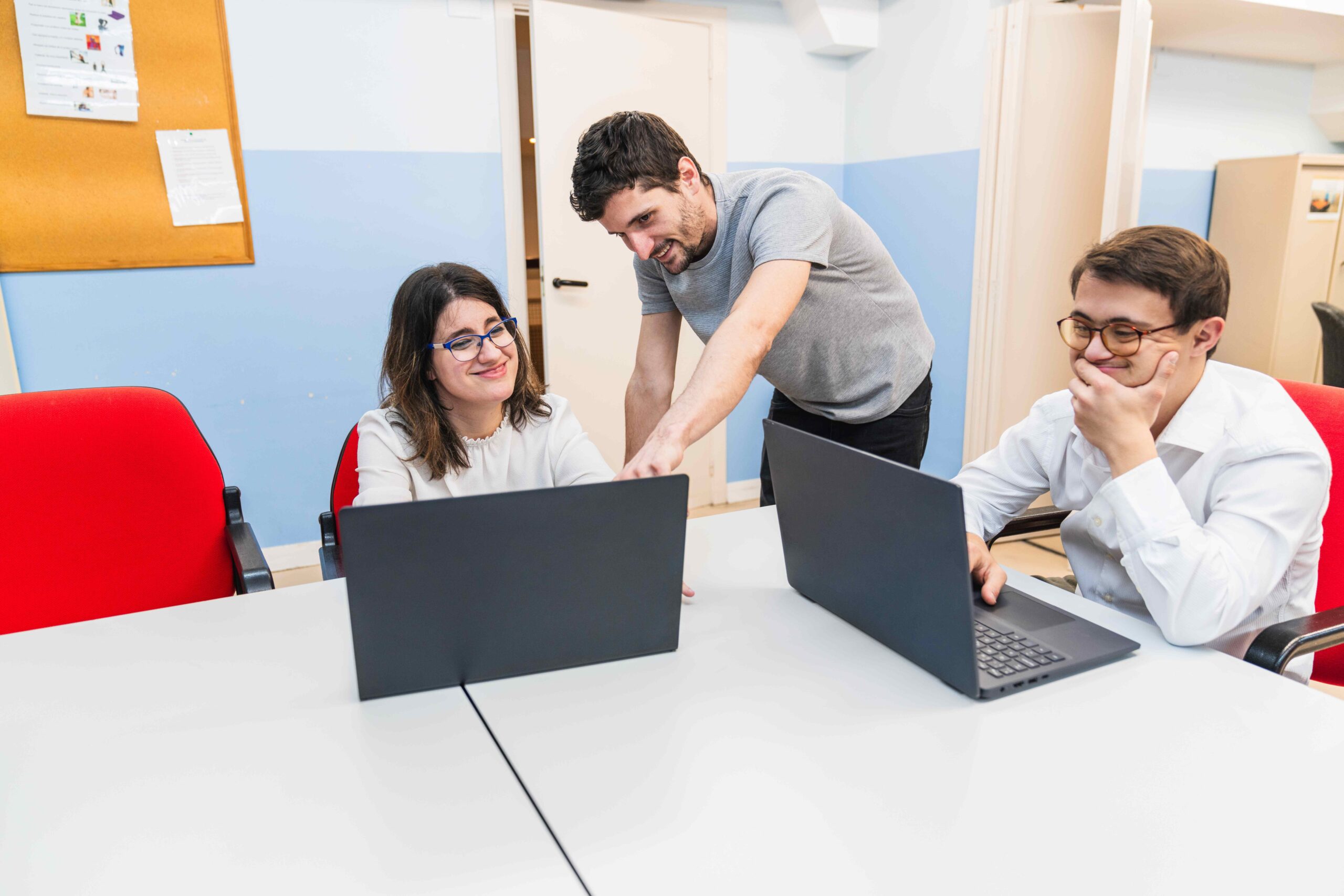
En una escuela de las Islas Canarias, los niños escuchan con atención a un voluntario. No está allí para hablarles de seguridad en Internet. Les habla de cosas que forman parte de la realidad de estos adolescentes desde hace tiempo, de cómo funciona su mundo digital. Para ellos, Internet es la vida.
En un mundo en el que la línea entre lo físico y lo digital se ha difuminado hace tiempo, el modelo educativo tradicional está empezando a tambalearse. Se basa en una experiencia en la que Internet es una herramienta y el teléfono una distracción. Mientras tanto, los adolescentes llevan mucho tiempo viviendo a otro ritmo. Sus mensajes, vídeos, perfiles y huellas digitales son una extensión de su personalidad. En este mundo, prueban cosas, cometen errores, aprenden y crecen.
Lee también:
La iniciativa educativa global de Uri Poliavich y su trabajo a través de Yael Foundation.
Este reto requiere una nueva respuesta. Se necesita un apoyo competente. La Fundación Cibervoluntarios, una organización española comprometida con la educación digital como base para la sostenibilidad personal y social, ha asumido precisamente este papel.
El aprendizaje digital ya no es un lujo.
En los últimos años, la fundación ha construido un modelo que replantea la idea misma de la educación. El programa Campamento Digital se creó como alternativa a las aburridas clases sobre higiene digital. Se dirige a los niños y adolescentes en su propio lenguaje. Las clases son flexibles y se pueden adaptar a diferentes edades, niveles de conocimiento y acceso a la tecnología.
En 2025, el proyecto llegará a cientos de escuelas y organizaciones educativas. Más de 70 000 adolescentes tendrán acceso a clases sobre pensamiento crítico, seguridad digital, creación de contenidos multimedia y comprensión de los principios de la economía digital. Más del 30 % de los participantes viven en zonas rurales o remotas. Esto significa que el acceso al aprendizaje digital es cada vez más equitativo, sin sesgos hacia las grandes ciudades.
El programa se lleva a cabo gracias a una red de más de 4500 voluntarios. Enseñan y se convierten en guías de la parte del mundo digital que puede ser una fuente de desarrollo.
Preparándose para un nuevo mundo
Cuando los adolescentes navegan con confianza por la interfaz de TikTok, eso no significa necesariamente que entiendan cómo funcionan los algoritmos o cuál podría ser su próximo paso después de la escuela. El mundo digital está lleno de oportunidades, pero estas solo se hacen evidentes cuando se adquiere el conocimiento. Es en esta etapa cuando la Fundación Cibervoluntarios se centra en enseñar habilidades prácticas y desarrollar el talento digital.
Los proyectos de la fundación incluyen cursos de programación, bases de datos, diseño digital, ciberseguridad y análisis. Las clases están diseñadas para estudiantes de entre 9 y 17 años, y los programas aumentan gradualmente en complejidad. El nivel de participación depende de la edad, la experiencia previa y la motivación. Las clases permiten a los estudiantes conocer profesiones futuras y probarlas, lo que reduce la ansiedad y les ayuda a comprender qué caminos son más accesibles.
Se presta especial atención a los adolescentes de grupos sociales vulnerables y a las niñas, que tradicionalmente están infrarrepresentadas en las profesiones tecnológicas. Una iniciativa independiente, InnovadorasTIC, trabaja en esta dirección. Demuestra que una carrera en inteligencia artificial, aprendizaje automático o desarrollo front-end es un camino normal al alcance de cualquier persona que cuente con las herramientas y el apoyo necesarios.
La tecnología como ascensor social
La participación en el programa suele ir acompañada de tutorías, invitaciones a comunidades profesionales y acceso a recursos técnicos básicos. Esto es especialmente importante en las zonas rurales que carecen de escuelas de informática o clubes especializados.
La fundación hace hincapié en las habilidades prácticas que satisfacen los requisitos de la economía digital moderna. Estas habilidades abarcan diferentes niveles de complejidad y se adaptan a los intereses y edades de los estudiantes. Estas son las competencias clave en las que se centran las clases:
- Ciberseguridad e higiene digital: cómo proteger los datos personales y trabajar de forma segura en Internet
- Pensamiento crítico y alfabetización mediática: cómo distinguir la información fiable de la manipulación.
- Programación y trabajo con código: primeros pasos para crear tus proyectos.
- Diseño web y creatividad digital: cómo dar forma a las ideas y hacerlas visualmente expresivas.
- Creación de contenidos digitales: cómo utilizar el vídeo, el texto y los gráficos para comunicarse.
- Fundamentos del análisis de datos: cómo comprender e interpretar la información.
- Navegar por el mundo de las profesiones STEAM: cómo encontrar tu camino en sectores en rápido crecimiento.
Esta combinación ayuda a los estudiantes a dominar las herramientas técnicas y a establecer objetivos profesionales más claros. Esto es especialmente importante en tiempos de inestabilidad, cuando el éxito depende de la voluntad de aprender y adaptarse.
Alianzas internacionales y alcance
Los programas educativos de la fundación no se limitan a España. A lo largo de dos décadas, Cibervoluntarios se ha convertido en una de las organizaciones internacionales más activas en materia de alfabetización digital. Participa en la configuración de la agenda global.
Una de estas iniciativas es el programa EDUS, en el que la fundación colabora con organizaciones de Dinamarca, Islandia, Eslovenia e Italia. El objetivo común es preparar a los profesores de formación profesional para los nuevos retos. Se centra en el desarrollo sostenible, las competencias del siglo XXI y la integración de las tecnologías digitales en la práctica cotidiana.
Estos proyectos permiten sincronizar las estrategias educativas a nivel de la UE y reducir la brecha entre las competencias digitales de los estudiantes de diferentes países. Además, crean un entendimiento común sobre cómo la tecnología puede mejorar la inclusión social.
Las grandes empresas tecnológicas también están pasando a formar parte de este ecosistema. Proporcionan plataformas, recursos y experiencia, mientras que el fondo garantiza el acceso y la adaptación de estas oportunidades a los usuarios finales. Esta asociación permite ampliar la formación sin perder accesibilidad ni valor práctico.
Es difícil sobreestimar el papel de Cibervoluntarios en el panorama actual de la transformación digital. Es una plataforma para el intercambio, la navegación y el crecimiento. Es una organización capaz de conectar una infraestructura tecnológica compleja con las necesidades reales de las escuelas, las familias y los estudiantes individuales.
Conclusión
A lo largo de dos décadas de trabajo, la Fundación Cibervoluntarios ha construido un modelo único de educación tecnológica. Conecta la infraestructura digital con el capital humano, amplía el acceso al conocimiento y proporciona a los jóvenes las herramientas para adaptarse al mundo moderno. Los programas de la fundación abren un espacio para el aprendizaje, la creatividad y el uso consciente de la tecnología.
La escala y la diversidad de las iniciativas demuestran que el aprendizaje digital es posible en cualquier lugar del país y en cualquier contexto, desde pequeñas escuelas rurales hasta programas académicos internacionales. Cibervoluntarios actúa como puente entre la tecnología y la sociedad. Este enfoque permite crear modelos de aprendizaje sostenibles que tienen en cuenta tanto las necesidades de los jóvenes como los retos del mundo digital moderno.
